While still very little, St. Thomas was seized with fever, and when he was getting better, the Blessed Virgin appeared to him in the form of a beautiful lady, who bent over his bedside, and, promising him that he would soon be well, gave him two golden keys, which she said were the keys of paradise, of which he was to have charge. Thomas went to a school in the city when first his studies began, but he was soon given into the care of the Prior of Merton, who was afterwards his confessor and friend, and witnessed his martyrdom.
Gilbert-a-Becket was a native of Normandy, and so many of his own countrymen came to visit him in London; one of them called Richier de l'Egle, was very fond of hunting and hawking, and often took St. Thomas as a companion. One of these times they had reached afoot-bridge across a mill-stream, which the knight crossed safely, but Thomas, taking less care, managed to tumble with his horse into the stream, and being unable to swim, he was rapidly borne along in the direction of the mill-wheel, which would certainly have crushed him to pieces. But at the cry for help the miller heard, the mill was stopped in time for the boy to be saved, and dragged out of the water almost insensible.
After finishing his education in England, St. Thomas was sent to Paris for a short time, when he returned to London and became clerk to the sheriffs until he was about one and twenty; then his parents died within a short interval, leaving their family very ill provided for. St. Thomas next entered the service of a relation who was a rich merchant, and thus learnt habits of business which were very useful to him afterwards, when he was raised to a high place in the Church. Many times Thomas had been advised to offer himself to the service of Theobald, the Archbishop of Canterbury, but his humility kept him back until he was five and twenty, when he was persuaded to do so by a friend of his father's, who felt sure that a higher vocation awaited him than the business of the world.
Theobald received the young man with much kindness, and St. Thomas at once set to work to make up for the deficiencies he quickly discovered in himself, and succeeded in gaining the esteem and confidence of the archbishop so entirely, that when Henry Plantagenet came to be king, Theobald obtained for a-Becket the place of Lord High Chancellor of England. This office was a very important one; he who held it was the keeper of the king's seal, and took charge of the royal chapel, and had the disposal of all the abbeys and bishoprics which were vacant and belonging to the king's right of patronage'; many other privileges belonged to the position which St. Thomas had been given, and which he filled with such great discretion. His life now was full of the whirl of state business, and yet his heart was not in it; often he would speak of his weariness and longing for a quiet and retired place where he might serve God only; but he used his power for the good of the Church and country, and for the divine glory, influencing the king to many acts of mercy and justice. But whilst he was surrounded by luxury and grandeur, his own fare was as simple as it could be. Under his splendid clothing he wore a hair-shirt, and after passing a day in royal pleasures, he would lie upon the floor during the night, doing many acts of humiliation and penance, and thus he remained unharmed by the world in which he had to live, keeping his heart fixed upon God.
Archbishop Theobald died during the month of April, 1161, so Henry II. fixed upon Thomas-a-Becket to succeed him, and in June, 1162, he was consecrated in the Cathedral of Canterbury, in the presence of an immense assemblage. A different life began for St. Thomas now—one which he had long desired. Every night he rose to say Divine Office with his monks, and then he washed the feet of thirteen poor men, to whom he gave a good meal before sending them away. At the dawn of day, he slept for a short time, and then rose to study the Scriptures; after which, he gave himself to prayer before saying Mass, or assisting at it During dinner, he had some spiritual book read aloud, but he did not force his soldiers to be present lest they might grow weary. Seats were always kept for a number of poor people, but afterwards a large quantity of food was given away to the crowds who came asking alms.
After a time, the king's great friendship for St. Thomas began to grow cooler, and the first
signs of his displeasure arose in several ways. One was a sermon which St. Thomas preached before Henry, in which he said that spiritual power was nobler and higher than that which is temporal; another was, that the archbishop objected to and succeeded in preventing an unfair tax being laid upon the people. Then, Henry encouraged an abbot in refusing to take the oath of obedience to the archbishop, and it became a struggle whether the Church should be governed as our Lord Jesus Christ had appointed, or whether a king was to be its ruler. Great difficulties seemed hanging over England, for Henry wished to begin reforms and changes which St. Thomas refused to agree too, but when the king pledged himself never to do anything to the injury of the Church, the Saint believed his word, and said that upon that condition he would not oppose the royal power.
A council of bishops and nobles was called to meet, so that St. Thomas should be forced to repeat this promise in public, and a paper was drawn up, upon which these "customs," as they were called, had been written, to which he was required now to affix his signature and seal. The Saint, who saw now what he was being made to consent to, refused to sign until he had communicated with the Pope, and no rage of Henry's could induce him to swerve from this decision; but his heart was sad and heavy, for he feared that by his first general promise to accede to the king's wishes, he had been weak instead of strong in the cause of the Church which it was his duty to guard and protect. So tender was his conscience, that for this fault which he deemed so serious, St. Thomas performed severe penance, and deprived himself of the right to say Mass until he had received the forgiveness of the Pope. The Pope wrote to comfort him, and assure him that for any fault there had been of weakness in yielding to the king, God would grant forgiveness, and supported him in his determination not to sign the royal papers which contained such alterations in the government of the Church.
From that time, St. Thomas began to prepare for his martyr's crown, for Henry Plantagenet sought to annoy and persecute him in every possible way—he was ordered to give up his property, called upon to pay an impossible sum of money, and summoned to appear before the court which had judged him. On the first day, the archbishop was confined at home by sickness, but on the Tuesday he rose, said Mass at his own altar, in which he offered up himself in union with the Divine Sacrifice, to suffer according to God's holy Will; then, as the custom of the time was, in any special trial, he placed the Blessed Sacrament in his breast and set out for the court, carrying his own cross, in token of his sacred office. When the king heard of his arrival, he was awe-struck, and stayed in an inner room, for he feared to face the representative of God, and there his nobles followed him, leaving St. Thomas and his bishops alone in the council chamber. The Earl of Leicester at last returned to pass judgment, but the archbishop refused to hear him, reminding him that he had no power over one who was the spiritual father of the king, the nobles and people, and then rising, he left the court, saying, "I put my cause and the cause of the Church under the protection of God and the Holy Father."
On reaching the gate, St. Thomas mounted his horse, but they found themselves locked in; however, one of his followers saw a bunch of keys hanging on a nail in the wall, and, fortunately, the first which he tried opened the gate. When the king heard how the archbishop had left, he was frightened lest some terrible judgments from Heaven should befall him, so he thought to protect himself from God's punishment by sending a herald through the town to order that no one should do St. Thomas any injury; but his command was unnecessary, for the people loved our Saint so warmly that they were rejoicing over- his safe return from the council. They crowded round him, so that he could scarcely get through their midst, kneeling for his blessing, and the sight of their devotion gave him great joy in the midst of his troubles.
Many of his followers had deserted the holy archbishop, but the poor whom he loved were invited to fill their vacant places at his table. When supper was ended, St. Thomas desired to remain the whole night in the Church, but after Office had been sung, he escaped from the monastery with three faithful friends upon strong horses which had been prepared in case a flight was necessary. It was a wet night, and they rode unobserved along the streets, reaching a village half-way to Lincoln before morning, where they rested a short time, and then started again for Lincoln. Here St. Thomas with one of his followers took a boat and went by water to an island on which stood a convent belonging to the canonesses of St. Gilbert of Sempringham, whilst the others journeyed there by land. They rested three days, and then set forth once more, travelling on foot towards Kent, from whence they crossed to the Flemish coast, landing after a stormy passage near Gravelines. But here the Saint was so weary, that his friends tried to get a horse for him; however, when the boy who had been sent for one returned, it was with a miserable ass, without a saddle, and with a halter of straw; so they threw a cloak over it, and S. Thomas mounted and rode a couple of miles, but he found it was more wearisome than walking, so he dismounted and dragged his weary steps along with great difficulty. A poor woman, struck with his noble appearance and evident fatigue, ran into her house and fetched him a rough stick to help him on his way, which he accepted with many thanks.
Soon after they met a party of young men, one of whom carried a hawk on his wrist; and as the archbishop's eyes rested upon the bird, one of them recognized him, and exclaimed, "I believe that is the Archbishop of Canterbury." But as one of his followers retorted, "You simpleton, did ever you see an archbishop travel in such a guise ?" they were allowed to pass on without further remark, and at length, after many difficulties, arrived safely at St. Berlin's monastery, where a trusty follower was waiting for St. Thomas, with a portion of the plate and money he had secured from Canterbury.' But they could not remain long where they were, in the territory of the Count of Flanders, so once again they journeyed on, until they were safe in the dominions of Louis, King of France.
For seven years the Saint remained in exile—years in which he lived as a simple monk at Fontigny, in the community which received him with great delight, joining the brethren in their out-door occupations, assisting at their Office in choir, and keeping to a course of mortification and penance. Now the quiet and leisure he had often desired was his. It pleased Almighty God at this time to reveal to our Saint the future before him, for once, while he was praying after Mass at the altar of S. Stephen, he beard a voice calling"Thomas! Thomas f upon which he answered, "Where art thou, Lord?" Then the heavenly voice replied, "I am Jesus, thy brother and thy Lord. My Church shall be glorified in thy blood, and thou shalt be glorified in Me."During the archbishop's absence, the King of England took all his property at Canterbury, banished all his servants, even turning every poor man and woman who had shown him any kindness in his wanderings, out of
their homes in the cold winter-time, to seek shelter in Flanders. But his cruelty made every Catholic in Europe indignant with him, and charitable to the poor sufferers. The King of France tried to put an end to Henry's angry feelings, and bring him round to be once more friendly with the exiled archbishop, but in vain. After giving him time to cool down his passion, St. Thomas himself wrote to the king in a kind and gentle way, but no answer was returned to the first or second letter, and the third brought a sharp answer; and yet Henry was very much frightened, for he dreaded the sentence of excommunication which he knew he had deserved. Obstinate as he was, his faith in the Church was sufficient to make him fear her anger. Indeed the Saint felt now that his next step must be to cut off the rebellious monarch from communion with the Church, but by the advice of the Pope he put off the sentence in the hope of peace being made.
After several years of humiliations and false accusations, which the Saint endured with patience and holy joy, a reconciliation was brought about by the King of France, who had persuaded Henry Plantagenet to be his guest, and see the archbishop once more; and at this meeting Henry asked him to return, promising to restore him his see of Canterbury, and to uphold the power of the Church. It was on December 1,1170, that St. Thomas landed at Sandwich, from which he continued his journey to Canterbury upon the same day—the place where within a month he was to die for the cause of God. His journey was a continual triumph, for people flocked from all parts to meet and welcome him, and in his own city there was every sign of joy—the churches resounding with music, and the streets decked out as for a public holiday. St. Thomas went straight to his own cathedral, his face shining with the happiness of his heart, and in the chapter-house he preached a sermon from the words, which seemed almost like a preparation for his fast-approaching death, "We have here no abiding city, but seek one to come."
In about a week, the archbishop proceeded to London, where he was received with great
expressions of joy, the priests and people meeting him, and the "Te Deum" being sung. The young king (whom Henry had caused to be crowned during his own lifetime) sent the archbishop a message, forbidding him to make any more .processions about the country, and advising him to return to Canterbury. This gave St. Thomas much sorrow, for he knew that Henry's son was really attached to him, and that this message must be caused by the influence of others — it seemed to confirm him in his belief that new persecutions and sufferings were beginning.
The Saint wrote to a friend (the Abbot of St. Albans) to meet him at Harrow, and begged him to go and procure him an interview with the young king; and the Abbot obeyed, but without success. Then St. Thomas returned to Canterbury for the Feast of Christmas, but some of his enemies had already crossed over to Normandy, where King Henry was staying, complaining of his renewed power, and of the journeys he was making amidst the rejoicing people. Henry Plantagenet's eyes flashed with rage, and with an oath he cursed all those who did not rid him of one who annoyed him in this way. Then he left them, little thinking what were to be the consequences of those words spoken in his furious passion.
The four knights went out from King Henry's presence, determining to take him at his word, and, starting by four different routes, they reached England and Saltwood Castle at the same time. Next day they went to St. Augustine's Abbey, outside the walls of Canterbury, and spent the time in making their preparations for the sinful deed they had in view. The last morning of his life, the Saint assisted at Mass in the Cathedral, went to confession, scourged himself three times in his spirit of contrition and penance, and spent some hours in talking with his monks of spiritual things. At four in the afternoon the wicked knights came and asked for the archbishop, who received them with his usual courtesy, but they took no notice, looking at each other so strangely that he felt sure they had come for an evil purpose. They professed to have brought a message from the king, but not having an opportunity of attacking their victim, they at last left the room noisily, with threatening words.
The archbishop, with his monks, went to assist at vespers in the choir, but he withdrew alone to the altar of St. Benedict to think and pray, for he felt convinced that the hour of his death had come. As he was just ascending the steps to the choir, one of the knights appeared with his sword drawn, followed by the other three. Some one rushed to bolt the door leading to the cloister, so as to give the Saint an opportunity of escape, but he came down the steps to meet the knights, asking them what they desired. " Your death," replied one, and they tried to drag him from the church, but the Saint pushed the murderer from him, saying, " Touch me not—you forget that you owe me submission." Then, finding they could not get him from the church, Fitz-Urse waved his sword above the Saint, whilst he bowed his head, and commended his soul to God. Three times they struck him, and then falling on his face before the altar of St. Benedict, he breathed his last, saying, "For the Name of Jesus, and for the defence of His Church, I am ready to die." Then the wretched murderers ran through the palace, taking every valuable they could secure, and afterwards they departed, glorying in their awful deed.
When the news spread, people flocked to the church, weeping and lamenting for the Saint, who was so dear to them. They threw themselves down hy the holy corpse, kissing the hands and feet with reverent love, while others secretly cut shreds from his garments or took away some of the blood which had flowed from him. That night there was an awful thunder-storm, and amidst the flashes of lightning which lit up the church, the monks kept watch by the remains of the holy martyr, who lay there beautiful in death, a calm smile still on his lips as it had been through life, a fresh colour upon his cheeks, and an air of peace surrounding him, as if he had died in an untroubled sleep rather than by violence.
Next day they dressed him in his hair shirt, with the vestments of his office to cover it, and, laying him in a marble coffin in the crypt, they closed and left it for a while. But miracles began to be worked by the relics which had been carried away, and people flocked to the church, begging to kneel at the shrine. Then the enemies of the martyred Saint threatened to carry off his remains by force, so that the monks in terror were compelled to place the body in a wooden coffin, and hide it behind the altar of the Blessed Virgin until they could carry it once more down to the crypt, where it was enclosed in a marble coffin, round which strong walls were built, and in the roof of which two openings were left, through which pilgrims might touch and kiss the coffin. For a long time the cathedral was in mourning, for the terrible bloodshed which had desecrated it; no Mass was said there, the crucifixes were veiled, the altars stripped, and everything wore an aspect of gloom.
When the news reached Henry Plantagenet, his remorse was terrible. Too late, he saw the consequences of his ungoverned passion—too late he mourned for those hasty words which had brought about the death of such a faithful servant of God, and one who had been so good and patient a friend to himself He shut himself up in his misery, he took off his royal robes and dressed in sackcloth, he fasted, he did penances, but God inflicted greater punishments on him than these. For more than a year Henry was excommunicated, and then had to do public penance for his sin before absolution was given him.
On the 21st February, 1173, St. Thomas of Canterbury was solemnly canonized as a martyr
for the cause of God, and his festival appointed to be kept on the 29th December, which was the day of his death. The body was removed to the place in the chapel of the Blessed Trinity where he had said his first Mass, and a splendid structure was raised to contain those holy relics. There the rich and great, the poor and unknown thronged to the shrine of the martyred St. Thomas, through whose intercessions many prayers were answered.
The death of the Saint of Canterbury brought peace to the Church in England, for in Henry's contrition he restored all the rights which he had deprived her of in that or any other land; and although in later times, when this unhappy country had turned away from the true faith, the martyr's tomb was destroyed and his sacred relics burned, his name still lives, and his memory is cherished as it deserves.
Now in our own times St. Thomas has been given the title of Patron of the Secular Clergy, and churches are rising up in honour of him who shed his blood to keep for the Church of Christ in England that place which, though lost in later years by the faithlessness of its own children, will belong to it again when the errors which prevail are overcome by the power of God's truth, and Jesus in the Blessed Sacrament is dwelling within every sanctuary throughout the land, amidst the reverent love of a faithful Catholic people.
Source: Saints for Children, Vol III, 1878
A coloring picture for the children can be found below.
| thomas_becket_-_december_29.pdf |
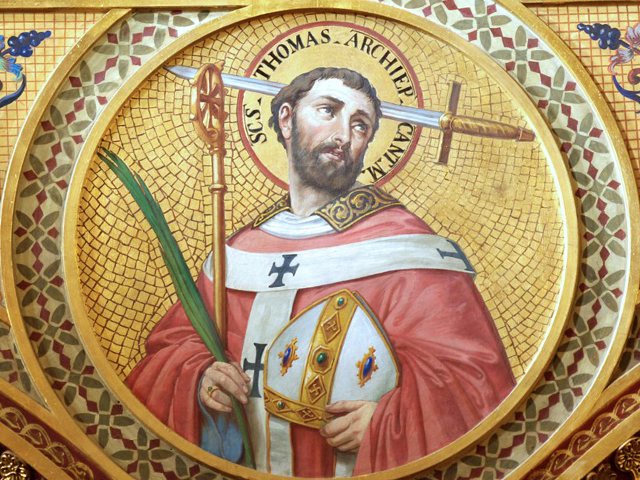
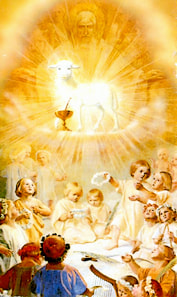
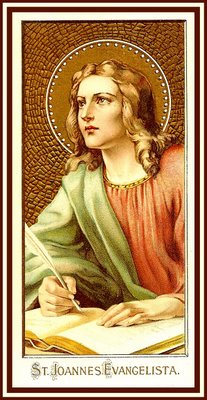
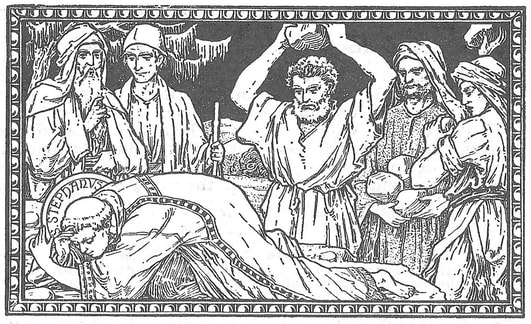

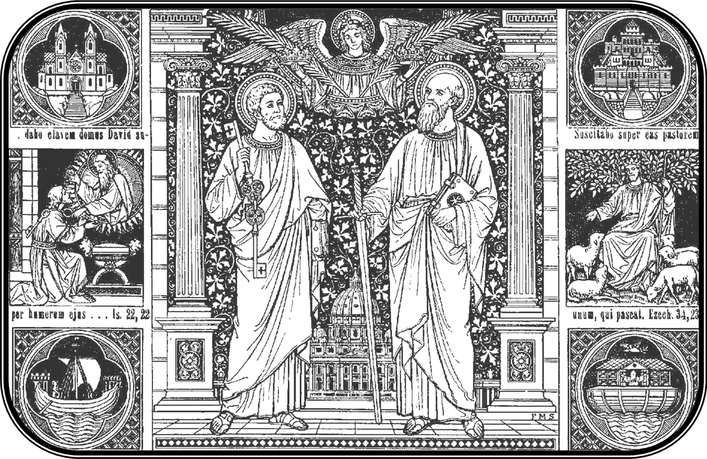
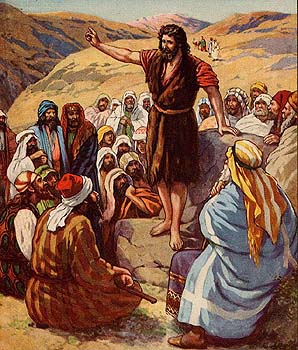
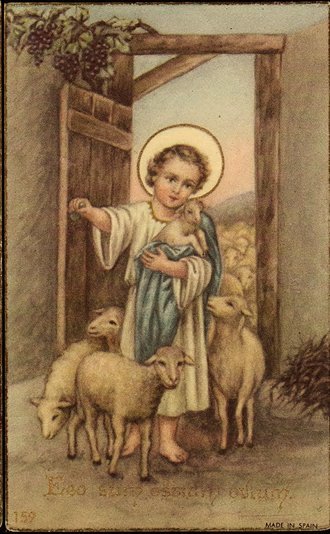


 RSS Feed
RSS Feed